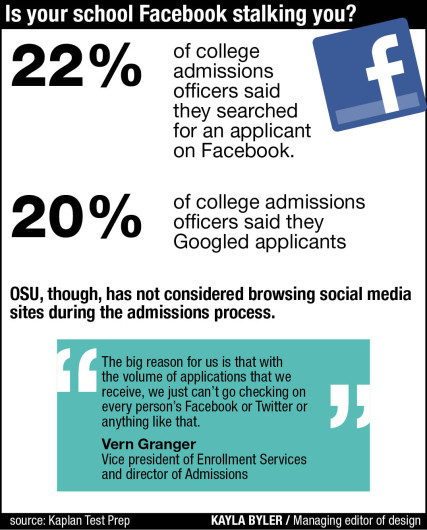
Ohio State isn’t checking up on tweets or browsing through Instagram photos when looking at which students to admit.
While some schools visit prospective students’ social media profiles during the admissions process, OSU officials said the university focuses on the traditional application.
According to an infographic published by Kaplan Test Prep, roughly 22 percent of admissions officials have looked at a potential student’s Facebook when assessing an application.
OSU, however, has not considered browsing social media sites during the admissions process, said Vern Granger, vice president of Enrollment Services and director of Admissions.
“The big reason for us is that with the volume of applications that we receive, we just can’t go checking on every person’s Facebook or Twitter or anything like that,” Granger said. “We go by what’s provided by the student: their application, their personal statement, letters of recommendation, test scores, transcript. So that’s the basis of our admissions process.”
OSU saw an increase in student applications to 35,000 from 28,000 applications in just one year, said Dolan Evanovich, the vice president for strategic enrollment planning, in September.
Granger said he does not expect OSU to change its practices anytime soon.
“We’ve never had any serious conversations, at least since I’ve been here, about utilizing it,” Granger said. “Because again, I think from the student information we get … we have enough information right there to make a decision on the application.”
Natalie Eastham, a second-year in sociology, said admissions officers should focus solely on application materials.
“They should only look at the traditional application because social media is used for being social,” Eastham said. “If there’s one thing in their (a student’s) social life that doesn’t fit what a university wants, then it can impact their entire future.”
Patrick Steffan, a first-year in economics, said while he doesn’t believe a college should take social media into consideration, he understands why some do.
“It’s just a privacy thing, but I guess since (the sites are) public, there’s no reason why they shouldn’t,” Steffan said.
Nat Smitobol, a college admissions counselor at IvyWise, an independent college counseling firm, has also worked as an admissions officer at New York University and Skidmore College. He said although social media can benefit a student in some ways during the admissions process, the opposite scenario, where a student’s reputation is harmed, is what’s usually talked about.
Smitobol said social media’s impact on admissions can be difficult to predict, but he advises students to be careful in what they post.
“It’s unfortunate because there’s not really a precedent,” he said. “You really have to approach social media in a totally different way, especially Facebook and Twitter. You just can’t post photos you wouldn’t want a future employer seeing, a college seeing.”


